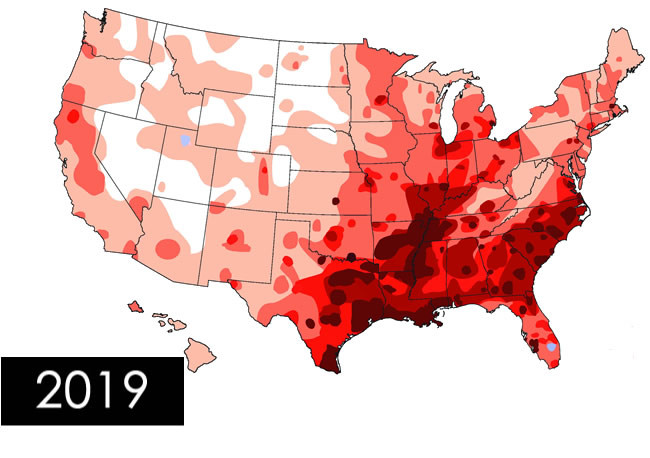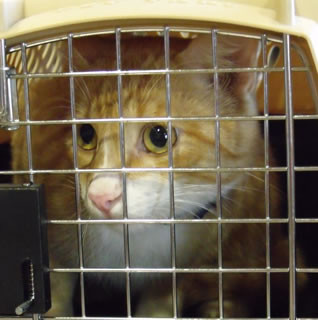Heartworm disease is a grave and potentially deadly illness affecting pets across the globe, particularly Dogs And Cats. Caused by parasitic worms residing in the heart, lungs, and associated blood vessels, this disease leads to severe lung conditions, heart failure, and damage to other vital organs. While heartworms can affect ferrets and other mammals, including wild animals like foxes and coyotes, this article focuses specifically on the risks, symptoms, and protection strategies for dogs and cats, ensuring your furry companions remain healthy and heartworm-free.
Understanding Heartworm Disease in Dogs
Dogs are natural hosts for heartworms. This means that once inside a dog, heartworms mature into adults, reproduce, and their numbers can escalate significantly if left untreated. A single dog can harbor hundreds of these worms, each causing lasting damage to the heart, lungs, and arteries. This damage can severely compromise a dog’s long-term health and overall quality of life, even after the parasites are eliminated. Therefore, heartworm prevention is paramount for dogs. When treatment is necessary, early intervention is crucial to minimize lasting damage.
Heartworm Disease in Cats: A Different Threat
Heartworm disease manifests differently in cats compared to dogs. Cats are atypical hosts, and in most cases, heartworms in cats do not reach full adulthood. Cats with adult heartworms typically have a very low worm count, often just one to three, and many infected cats may not even have adult worms present. Despite this, heartworms, even in their immature stages, cause significant harm to cats, leading to a condition known as heartworm-associated respiratory disease (HARD). Importantly, the medications used to treat heartworm in dogs are not safe for cats. This makes prevention the sole method of safeguarding cats from the devastating effects of heartworm disease.
Transmission of Heartworm Disease: The Mosquito’s Role
The mosquito is indispensable to the heartworm life cycle, acting as the vector that transmits the disease between animals. Adult female heartworms living within an infected dog, cat, or wild animal produce microscopic baby worms called microfilariae, which circulate in the bloodstream. When a mosquito bites an infected animal to feed on its blood, it ingests these microfilariae. Over the next 10 to 14 days, these microfilariae develop within the mosquito into “infective stage” larvae.
 Mosquito carrying heartworm larvae and infecting a dog
Mosquito carrying heartworm larvae and infecting a dog
When this infected mosquito bites another dog or cat, these infective larvae are deposited onto the pet’s skin and enter the body through the bite wound. Once inside the new host, it takes around six months for these larvae to mature into sexually mature adult heartworms. Adult heartworms can live for 5 to 7 years in dogs and up to 2 or 3 years in cats. Due to the long lifespan of these parasites, each mosquito season can contribute to an increasing number of worms in an infected pet if preventative measures are not taken.
Recognizing Heartworm Symptoms in Dogs
In the early stages of heartworm disease, many dogs may exhibit few or no noticeable symptoms. However, as the infection progresses, symptoms are more likely to emerge. Active dogs, dogs with heavy heartworm infestations, or those with pre-existing health issues often display more pronounced clinical signs.
Common symptoms of heartworm disease in dogs include:
- A persistent, mild cough
- Reluctance to exercise or decreased stamina
- Fatigue after normal activity
- Reduced appetite and weight loss
In advanced stages, dogs may develop heart failure, indicated by a swollen abdomen due to fluid accumulation. A life-threatening condition known as caval syndrome can occur in dogs with a large number of heartworms. This is caused by a sudden blockage of blood flow within the heart and is characterized by labored breathing, pale gums, and dark, bloody or coffee-colored urine. Caval syndrome requires immediate surgical intervention to remove the heartworm blockage, otherwise, survival is unlikely.
Identifying Heartworm Symptoms in Cats: Often Subtle
Heartworm disease in cats can be challenging to detect as symptoms are often subtle and can mimic other feline conditions. In some cases, the first indication of heartworm in cats is sudden collapse or even death.
Symptoms of heartworm disease in cats may include:
- Coughing
- Asthma-like attacks or wheezing
- Intermittent vomiting
- Lack of appetite or weight loss
- Lethargy
Less common but possible symptoms include difficulty walking, fainting, seizures, or fluid accumulation in the abdomen. Due to the non-specific nature of these signs, heartworm disease in cats can be easily overlooked.
Risk Factors and Geographic Distribution of Heartworm Disease
While heartworm disease was once considered primarily a concern in warmer climates, it is now recognized as a threat in all 50 states. Several factors contribute to the spread and prevalence of heartworm, even in areas where it may not seem common.
Factors increasing heartworm risk include:
- Travel: Taking your pet to areas where heartworm is more prevalent, even for short trips.
- Relocation of Pets: The movement of infected pets from high-risk areas to previously low-risk regions.
- Wildlife Reservoirs: The presence of infected wild animals like coyotes, wolves, and foxes, which can maintain the heartworm cycle in an area.
- Mosquito Distribution: Mosquitoes can be carried by wind over long distances, expanding the reach of heartworm transmission.
- Climate Change: Shifting climate patterns can expand mosquito habitats and extend mosquito season in previously cooler areas.
 Heartworm incidence map in the United States
Heartworm incidence map in the United States
Even if you live in an area considered low-risk, factors like local climate variations, the presence of wildlife, and mosquito activity can fluctuate yearly, making it difficult to predict the actual risk. Moreover, mosquitoes can enter homes, putting both indoor and outdoor pets at risk.
Heartworm Testing: Essential for Early Detection
Heartworm disease is a progressive illness, and the earlier it’s detected, the better the chances of successful management and minimizing long-term damage. Since early heartworm infection often shows minimal to no symptoms in dogs and cats, regular heartworm testing by a veterinarian is vital.
The heartworm test is a simple blood test that detects heartworm proteins (antigens). Veterinarians can perform these tests in their clinics or send samples to diagnostic laboratories, with results available quickly. If a pet tests positive, further confirmatory tests may be recommended.
Heartworm Testing Guidelines for Dogs and Cats
Testing protocols and timing vary slightly between dogs and cats.
Dogs:
Annual heartworm testing is recommended for all dogs, typically during their routine preventive care check-ups. Specific guidelines include:
- Puppies under 7 months: Can start heartworm prevention without initial testing, but should be tested 6 months after the first vet visit, again at 12 months, and annually thereafter.
- Dogs over 7 months and not on prevention: Need to be tested before starting prevention, and then tested again 6 and 12 months later, and annually.
- Dogs with missed prevention doses: Should be re-started on prevention immediately and retested 6 months later to ensure no infection occurred during the unprotected period.
Annual testing is crucial even for dogs on year-round prevention to confirm the prevention is effective. While heartworm preventives are highly effective, they are not 100% foolproof. Missed doses, inconsistent administration, or even vomiting or spitting out medication can leave dogs vulnerable.
 Veterinarian taking blood sample from a dog for heartworm test
Veterinarian taking blood sample from a dog for heartworm test
Cats:
Heartworm detection in cats is more complex than in dogs. A combination of tests is often used, including both antigen and antibody tests. The antibody test detects exposure to heartworm larvae, while the antigen test looks for adult worm proteins. Veterinarians may also use chest X-rays or ultrasounds to assess for heartworm infection.
Cats should be tested before starting heartworm prevention and re-tested as recommended by their veterinarian to monitor ongoing risk and potential exposure. As there is no approved treatment for heartworm infection in cats, prevention is especially critical.
Treating Heartworm Disease in Dogs: A Multi-Step Process
Receiving a positive heartworm diagnosis for your dog can be concerning, but the good news is that most infected dogs can be successfully treated. The primary goals of treatment are to stabilize the dog, minimize treatment side effects, and eliminate all adult and immature heartworms.
If your dog tests positive for heartworms, expect the following steps:
- Diagnosis Confirmation: A positive antigen test should be confirmed with a second, different type of test to ensure accuracy before starting treatment.
- Exercise Restriction: Strictly limit your dog’s activity level as soon as the diagnosis is confirmed. Physical exertion increases heart and lung damage caused by heartworms. The more severe the symptoms, the more restricted the exercise should be.
- Stabilization: Before heartworm treatment begins, your dog may need stabilization therapy, especially in severe cases or if other health issues are present. This stabilization period can sometimes take several months.
- Heartworm Treatment Administration: Your veterinarian will recommend a treatment protocol based on guidelines from the American Heartworm Society. This typically involves a series of injections of an adulticide medication to kill adult heartworms.
- Post-Treatment Testing and Prevention: About nine months after treatment completion, a heartworm test will be performed to confirm successful elimination of all heartworms. Lifelong, year-round heartworm prevention is crucial after treatment to prevent re-infection.
Dogs with mild or no symptoms at the time of diagnosis generally have a high treatment success rate. More severe cases can also be treated successfully, but the risk of complications is higher.
 Dog resting in a cage during heartworm treatment
Dog resting in a cage during heartworm treatment
Managing Heartworm Disease in Cats: Focus on Support and Prevention
Unlike dogs, there is no approved medication to treat heartworm infection in cats. While some feline heartworm infections may resolve on their own, they can still leave behind permanent respiratory damage. Heartworms can also affect a cat’s immune system and cause various symptoms. In some cases, heartworms in cats may migrate to other parts of the body, such as the brain or spinal cord. The death of adult heartworms in cats can trigger serious complications like blood clots in the lungs and severe lung inflammation.
If your cat tests positive for heartworms, management will focus on:
- Diagnosis: Diagnosis in cats often requires a combination of physical exams, chest X-rays, blood tests, and potentially ultrasound. Cats typically have fewer worms than dogs, making diagnosis challenging.
- Symptom Management: Treatment focuses on managing symptoms and providing supportive care. There is no drug to kill adult heartworms in cats.
- Monitoring: Regular monitoring, including chest X-rays every 6-12 months, may be recommended to track the progression of the disease, especially if worms are detected in the lungs but symptoms are mild.
- Veterinary Care: Severe cases may require hospitalization for intensive supportive care, including intravenous fluids, medications to manage lung and heart symptoms, and general nursing care. In rare instances, surgical removal of heartworms might be considered.
- Prevention: Consistent, monthly heartworm prevention is vital for cats who have had heartworm disease, as they are clearly susceptible to infection. Prevention is available in both topical and oral forms.
 Cat in a cage receiving veterinary care for heartworm
Cat in a cage receiving veterinary care for heartworm
Heartworm Prevention: The Cornerstone of Protection for Dogs and Cats
Given the severity of heartworm disease and the complexities of treatment, particularly for cats, prevention is unequivocally the best approach for protecting your dogs and cats. The American Heartworm Society recommends year-round heartworm prevention for both dogs and cats, regardless of geographic location or lifestyle (indoor or outdoor).
Key aspects of heartworm prevention:
- Year-Round Prevention: Administer heartworm preventive medication to your dog and cat every 12 months.
- Veterinary Prescription: Heartworm preventives require a prescription from a veterinarian. This ensures your pet is tested before starting prevention and receives the appropriate medication and dosage.
- Regular Testing: Annual heartworm testing is essential, even with year-round prevention, to verify its effectiveness.
- Different Prevention Options: Heartworm preventives are available in various forms, including monthly chewable tablets, topical “spot-on” treatments, and injectable medications (for dogs, with options for 6-month or 12-month administration). Consult your veterinarian to determine the best option for your pet’s lifestyle and needs.
- Combination Products: Many heartworm preventives also offer protection against other parasites, such as intestinal worms, fleas, ticks, and mites, providing broader parasite control.
Frequently Asked Questions about Heartworm Disease in Dogs and Cats
Do I need a prescription for my pet’s heartworm prevention?
Yes, heartworm preventives are prescription medications. Veterinarians are required to prescribe these medications to ensure pets are tested for existing heartworm infections before starting prevention. Administering heartworm prevention to a dog or cat with an active heartworm infection can, in rare cases, cause adverse reactions. Testing is generally not required for very young puppies and kittens starting prevention.
 Veterinarian examining a dog in clinic
Veterinarian examining a dog in clinic
How do monthly heartworm preventives work?
Monthly heartworm preventives, whether oral, topical, or injectable, work by eliminating the immature (larval) stages of heartworms. They target the infective larvae deposited by mosquitoes and the subsequent larval stages developing inside the pet. Preventives must be given consistently and on schedule because they are only effective against these early larval stages. Once heartworms reach the juvenile/immature adult stage (around 51 days post-infection), preventives are no longer fully effective.
 Veterinarian administering medication to a dog
Veterinarian administering medication to a dog
Do heartworm preventives also protect against intestinal parasites?
Many heartworm preventives offer dual protection, also effective against various intestinal parasites like hookworms, roundworms, whipworms, and tapeworms. Some products even extend protection to external parasites such as fleas and ticks. Consult your veterinarian to choose the most comprehensive product for your pet’s needs.
When should puppies and kittens start heartworm prevention?
Puppies and kittens are equally susceptible to heartworm disease as adult pets. Start heartworm prevention as early as the product label permits, but no later than 8 weeks of age for both puppies and kittens. Dosage is based on weight, so regular weight checks and dosage adjustments are crucial as young animals grow.
Is heartworm risk higher in certain regions?
While heartworm disease is present across the US, certain areas, particularly along the Atlantic and Gulf Coasts and major river systems, have higher prevalence rates. Local factors like climate, mosquito species, mosquito breeding grounds, and the presence of wildlife reservoirs influence regional risk levels.
If I live in a northern state, is year-round prevention necessary?
The American Heartworm Society recommends year-round prevention even in colder climates. Mosquito seasons can be unpredictable, and some mosquito species can survive indoors during winter. Year-round prevention provides consistent protection and often includes deworming for intestinal parasites, which pose health risks to both pets and humans.
What if I live in a dry, desert climate with few mosquitoes?
Even in dry climates, microclimates and the presence of wildlife reservoirs can sustain heartworm transmission. Heartworm disease has been reported in nearly every county in states like Arizona. Year-round prevention is still recommended, especially if your pet travels to areas with higher mosquito populations.
Is there a heartworm vaccine available?
Currently, there is no commercially available vaccine for heartworm disease in dogs or cats. Prevention relies on consistent use of preventive medications prescribed by a veterinarian.
Are there natural heartworm preventives that are effective?
Only heartworm prevention products approved by the FDA have been proven safe and effective. Natural or alternative products are not recommended as reliable preventives.
What can cause death from heartworm disease in dogs?
Heartworm disease can lead to death due to severe damage to the heart, lungs, and blood vessels. Adult worms cause inflammation and block blood flow, leading to pulmonary thrombosis, heart failure, and organ damage. Massive infections can cause sudden death.
 Heartworms inside a dog's heart
Heartworms inside a dog's heart
Does age affect heartworm treatment success in dogs?
Age is one factor, but overall health and disease severity are more significant. Older dogs with long-term infections may have pre-existing organ damage that complicates treatment. Strict adherence to veterinary instructions, particularly exercise restriction, is crucial for treatment success regardless of age.
Is it okay to start heartworm prevention in a dog already infected with heartworms before treatment?
Yes, it is often recommended to start heartworm prevention in infected dogs before adulticide treatment. This prevents new infections during treatment and reduces the risk of the dog serving as a source of infection for mosquitoes. This should always be done under veterinary supervision.
Is there any alternative to the injection-based heartworm treatment for dogs?
The FDA-approved medication melarsomine, administered by injection, is the only recommended treatment for killing adult heartworms in dogs. While there are risks associated with treatment, it is generally safe and effective when performed under veterinary supervision with proper protocols, including exercise restriction. Long-term use of preventives alone is not an effective alternative to adulticide treatment as it does not eliminate adult worms and ongoing damage.
What if my dog’s heartworm test is still positive 4 months after treatment?
It can take several months for all adult heartworms to die and for the heartworm antigen to clear from a dog’s system after treatment. A positive test 4 months post-treatment may require retesting in another 2-3 months. In some cases, a second course of treatment may be necessary.
Should I give my ferret heartworm prevention?
Yes, ferrets are highly susceptible to heartworm disease and require year-round prevention, even if they are indoor pets. Heartworm disease progresses rapidly in ferrets due to their small heart size. Prevention is crucial as treatment options are limited for ferrets.
 A healthy ferret, highlighting the need for heartworm prevention in ferrets too
A healthy ferret, highlighting the need for heartworm prevention in ferrets too
Can I use expired heartworm medication?
No, expired medications should not be used. Expiration dates ensure the medication’s effectiveness and safety. Using expired medication may not provide adequate protection and could potentially be harmful.
What should I do if I missed 2 months of heartworm prevention for my dog?
Consult your veterinarian immediately. Restart heartworm prevention and have your dog retested for heartworms approximately 6 months later to ensure no infection occurred during the lapse in prevention.
Protecting your dogs and cats from heartworm disease is a vital part of responsible pet ownership. By understanding the risks, recognizing the symptoms, and consistently using year-round prevention, you can ensure your beloved companions live long, healthy, and happy lives.


